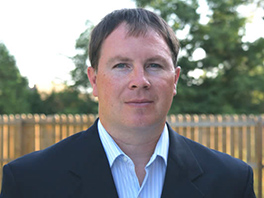Featured Article
UT Tyler’s Combs Helps to Improve Mental Health Outcomes in East Texas
 As a UT Tyler graduate student, Dr. Dennis Combs enjoyed conducting research so much
that he intended to enter academia one day upon his graduation in 1996.
As a UT Tyler graduate student, Dr. Dennis Combs enjoyed conducting research so much
that he intended to enter academia one day upon his graduation in 1996.
Since returning to UT Tyler in 2007, the alumnus not only gives back to the University as a CEP faculty member, but also to East Texas through his work with the Andrews Center, a nonprofit and comprehensive behavioral and mental healthcare facility.
Through a partnership between the Andrews Center Behavioral Healthcare System and University, Combs oversees UT Tyler graduate-level students who counsel low-income mental health clients at the center, which serves five East Texas counties. Students receive this hands-on, specialized training as part of the practicum training course offered within the UT Tyler Department of Counseling and Psychology.
“Being able to teach the next generation of clinicians, and at the same time, help people in East Texas who need the help, is extremely rewarding,” said Combs, a licensed clinical psychologist and UT Tyler professor of psychology. “We have great students in our program, and I always enjoy teaching and interacting with them.”
To date, Combs has trained about 30 graduate-level students at the Andrews Center, where he also conducts clinical practice and, along the way, recruits participants for research.
People struggling with mental illness often need medication and supports such as case management, housing and employment, and are often without insurance or the funds to receive help, according to Cindy Grace, chief of operations at the Andrews Center.
“The collaboration with UT Tyler through Dr. Combs has allowed us to provide counseling services to many of our clients who, due to the center’s limited number of therapists, we have been unable to provide,” Grace said. “We are thankful for his contributions and the great partnership we have with UT Tyler.”
East Texas has significant mental health issues and ranks at the bottom in terms of mental healthcare and access to services, Combs noted. According to the National Institute for Mental Health, one in 20 adult Texans – or 5 percent – have serious mental illness. In comparison, about one in 25 adults in the U.S. — 9.8 million or 4 percent — experiences a serious mental illness in a given year that significantly interferes with or limits one or more major life activities, such as communicating, working and caring for oneself. Serious mental illnesses include bipolar disorder, schizophrenia and major depression.
High rates of suicidal ideation, substance use and medication noncompliance are also found in the region, he said, noting that poor mental health care leads to health problems, problems working and high rates of disability and stress.
The professor has devoted more than 20 years to studying social cognition, paranoia and other psychological problems associated with schizophrenia. His research focuses on psychosis, schizophrenia and delusions.
Paranoia is more common than believed, Combs said, and about 10 percent of normal people have beliefs of mistrust. “People with paranoia are avoidant most of the time, and being able to interact with people leads to better care and improves work performance overall,” he said.
Current research assesses the relationships between people with paranoia and how they function with others, socially. Understanding this may help treat people with psychosis, Combs said. Specifically, he is comparing paper-and-pencil measures of paranoid ideation with those obtained from clinical interviews, or in-person assessments.
“So, we talk to people about mistrust and things going on in their life and then look at how they answer questions on paper tests,” Combs said. “We are trying to find better ways to assess and identify people with paranoia and mistrust. Understanding the best methods to assess paranoia may lead to improved understanding of the condition.”
Combs teaches graduate-level psychology courses in diagnosis, treatment and assessment. He also was instrumental in developing the new doctorate psychology program. In addition, Combs serves as director of the UT Tyler clinical training program, in which doctoral students may choose specializations in veterans’ issues, rural mental health or geropsychology.
His advice to students interested in the field of psychology is to actively participate in research early in their educational journeys.
“Get involved in research as early as you can. It is especially important to demonstrate research skills for admission to graduate programs in psychology,” he said.
Andrews Center Behavioral Healthcare System was originally established in June 1968 as the Smith-Wood County Mental Health-Mental Retardation Center. Services, including counseling and assessments, are provided in Smith, Wood, Rains, Van Zandt and Henderson counties.
Administrative offices and the Smith County clinic are located in Tyler, with additional locations in Athens, Canton and Mineola. For more information about the Andrews Center, visit andrewscenter.com.
#CEP




